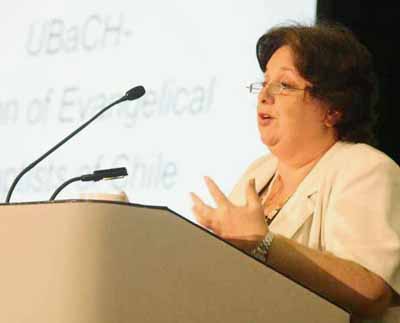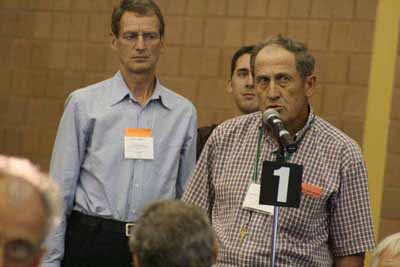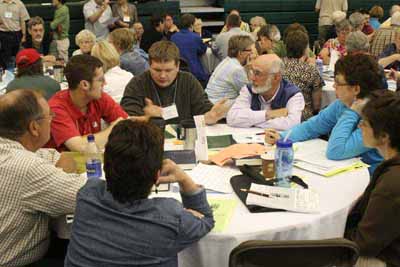Canadian Mennonite
Winnipeg Assembly Special Report
July 7-9, 2008

Promoting the peace message
Winnipeg
 |
Delegates discussed peacemaking, passed a peace proclamation motion, and heard testimony about Anabaptist peace theology in their two morning delegate sessions on the second day of the national church assembly in Winnipeg.
While Mennonites have a 500-year history of peace theology, the strongest delegate reaction of the morning—a standing ovation—came in response to someone speaking for a church that has adopted these priorities much more recently.
Raquel Contreras, president of the Baptist Union of Chile, a century-old group of about 500 churches in Chile, told delegates about her denomination’s decision to step onto a new theological path for their next hundred years: Anabaptism.
“We looked and looked, and we realized that our identity, our roots, came from the Anabaptists,” she said. “We thought that that was history, that that was not alive now. Then we realized that Anabaptists were still alive, that Anabaptism was not history, that Anabaptism was what really identified us as Baptists, that we shared common roots.
“We adopted this as one of our main principles,” she Contreras continued. “This has changed many ways in our convention. We realized that we can have a different lifestyle that shows peace, understanding, good manners, a different way of living.”
Contreras described how she, as head of the church, had just turned down a government request to bless a new warship; how congregations are declaring themselves places of peace in their neighbourhoods, and providing shelter for abused women and children; how the church has established a centre for Anabaptist studies and for publishing Anabaptist material; and how the church is working against bullying at school. She also said the Chilean church was putting peace theology into practice internally in their congregations, stating that “peace also means to eliminate gossip.”
Delegates responded with a loud gasp, followed by applause.
“We are very grateful to the Canadian Mennonite Church,” she concluded. “We are learning from you. You are showing us that to live as an Anabaptist is real and you can to it. You are showing us that this is alive, and this is possible, and we can live in a world where Jesus Christ can be the Prince of Peace and we can be for peace in our world.”
Delegates also shared their concerns over signs of militarism in Canadian society. Marilyn Rudy Froese, of Kitchener, Ont., said that the issue stopped being theoretical for her when her 10-year-old son came home from a school trip with a military poster and promotional hockey puck distributed to children by the Canadian Armed Forces. “It’s really important that we speak in the public square. They are targeting our children,” she said.
Delegates unanimously passed a resolution, with slight wording changes, presented by Osler (Sask.) Mennonite Church. It stated, in part, that, “realizing that we are called to bear witness for Christ and his message, we request that the staff of MC Canada develop a proposal for promoting the peace message in the ‘public square,’ and that it is presented at the 2009 annual delegate assembly.”
Lorne Buhr of Edmonton, passing on a comment from someone else who was not at the assembly, said that the Osler resolution seemed to be within the mandate of MC Canada and the Confession of Faith in a Mennonite Perspective already, and he questioned why there was a need for a motion at all. “If MC Canada needs to have a mandate on what it believes and to act on its belief, organizational ineffectiveness may prevail,” he said.
God not limited by stories or cultures
Winnipeg
 |
If the Apostle Paul visited modern-day Canada, what would he observe about the average Canadian’s spiritual views? That was the question explored in a monologue by Arlyn Epp Friesen, manager of Mennonite Church Canada’s Resource Centre, during the July 8 afternoon’s delegate session. The monologue was part of the fourth discernment session, “Confessing Jesus Christ in a religiously pluralistic world.”
“I’ve seen how restless your souls are for God in every way,” Epp Friesen said in character as the ancient apostle. “Almost everyone I’ve talked to, from B.C. to Newfoundland, are asking the ultimate questions: Where do we come from? Why is there suffering? What happens when we die?”
He went on to note that 80 per cent of Canadians claim to believe in a God who loves them personally, and three-out-of-four Canadians acknowledge that they pray privately. “Our searching would not be in futile desperation, because God, in fact, is close to everyone of us,” he said. “So if this is unknown to you, I want to make it plain: That this very God you grope after, this God who stirs up the restlessness in our souls and who is as close to us as the breath we breathe, this same God comes to each one of us . . . through Jesus Christ.”
Additional Resources |
After the monologue, the MC Canada Faith and Life Committee, led by Rudy Baergen, presented a document it has been working on to address how Canadian Mennonites can confess Jesus Christ when “there are trends in society which challenge [their] missional urge.”
Baergen noted that what one learns from the Bible is that God is present and active in the whole world, and not limited to any one story or culture. Canadian Mennonites “must value the universal and the particular work of God,” he said, because “God is active in all the cultures of the world, often in unexpected ways and places.”
“We acknowledge that God is greater than any human construct,” added Karl Koop, associate professor of history and theology at Canadian Mennonite University and a Faith and Life Committee member. “While other religions and spiritualities might appear foreign and strange, and may even offend us, on closer observation they may offer new and valuable ways of understanding who God is and how God is at work.”
 |
The committee outlined three implications:
• We are called into a respectful dialogue with those who profess a different faith.
• We are called to proclaim faithfully and courageously the gospel of God’s grace.
• We are called to live in peace with those of different religious persuasion.
The committee acknowledged issues requiring further reflection, including:
• What is the place for the biblical theme of judgment?
• What does it mean to engage our neighbours in matters of faith?
 |
Delegates spent 30 minutes discussing these and other questions at their tables. Four delegates reported back, including Harold Peters-Fransen of Winnipeg.
“We weren’t sure whether the tilt of the committee was that Jesus Christ was the only way, or whether we are to learn from other faiths,” he said, adding it would be useful if MC Canada supplied congregations with materials to grapple with these questions.
“As we confess Jesus Christ in a religiously pluralistic world, we find ourselves apologizing a lot for the history of the church,” noted Doug Klassen of Foothills Mennonite Church in Calgary, Alta. “In general, there’s distrust of religion in society.”
Baergen ended the session by stressing that the delegates’ comments will be used to revise the Faith and Life Committee document. “We see this as a complex issue, and this was just a beginning,” he said, “so, we will continue to work at it.”
Budget passed with little comment
Winnipeg
Additional Resources |
Turning to financial matters, delegates passed the national church proposed budget for the fiscal year ending January 2009 with little discussion.
The budget anticipates an operational deficit of $71,000 with this shortfall covered by a transfer from reserves. This is more that offset by the transfer to reserves of $170,000 from the past fiscal year ending in January 2008.
Assembly ends, Summit begins
Winnipeg
The final 90 minutes of the Mennonite Church Canada 2008 assembly included delegate affirmation of the nomination slate, an open floor for delegate comments, questions, and concerns, reports from the Listening Committee and Resolutions Committee, and a few words from incoming moderator Andrew Reesor McDowell.
McDowell spoke of how his parents have inspired his life of service to the church, and the important support of his wife and mother, both of whom were present.
The Listening Committee (Sue Schantz, Judith Doell, Randy Klaassen) emphasized the model of Raquel Contreras, church leader from Chile, and her peace witness, affirmed the church’s efforts to green its operations, acknowledged the efforts of incorporating worship into many aspects of the discernment sessions, and pondered whether the delegate assembly is a safe place to hear contrarian views. Doell, who also served on the Prayer Team, led a prayer of confession.
Hilda Hildbrand, representing the Resolutions Committee, said thanks to all whose participation made the assembly a success – from leaders to volunteers to delegates.
Questions and concerns from the delegate floor during open mic time paralleled the discernment topics (peace church, pastoral trends survey, Christianity in a pluralistic world) to a large degree.
Russ Klassen, 27, (Youth Pastor at Sherbrook MC, Abbotsford) invited delegates to encourage more youth and young adults from their respective congregations to attend annual assemblies. “I’ve gotten a lot out of being here,” he said.
Henry Funk, delegate for MC Saskatchewan, responded to Darren Kropf’s (Ont.) challenge to delegates to resist paying war taxes. Funk said that many in Saskatchewan have found a unique alternative by donating to the Canadian Food Grains Bank: each donation is quadrupled by the federal government and goes to feed hungry people around the world. He called it “An effective way to pay a peace tax.”
How this alternative might actively and directly address and change systemic political thinking about violence as a solution to conflict was not discussed.